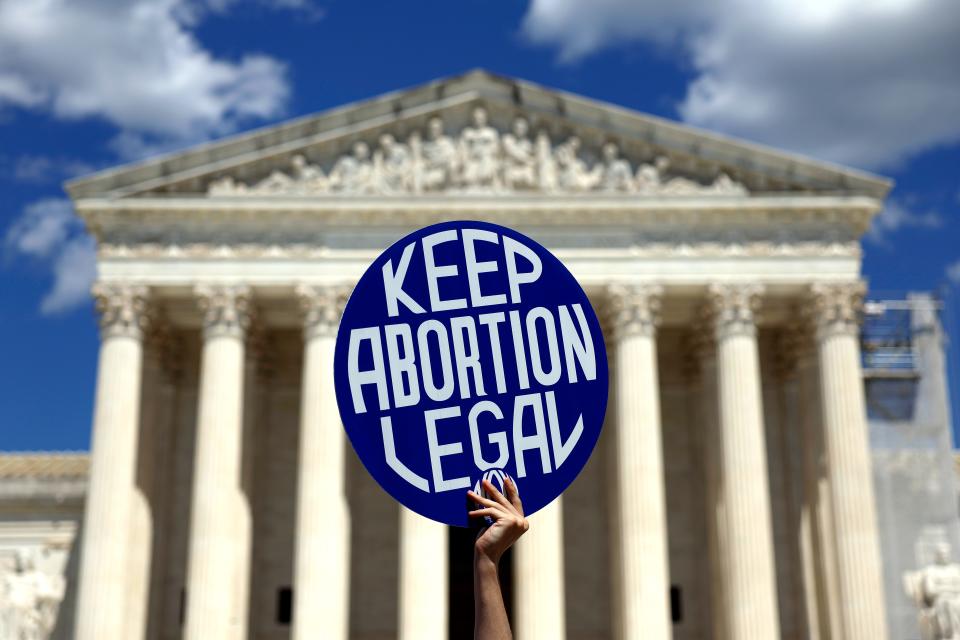Supreme Court allowed emergency abortions in Idaho. Doctors say it's not enough.
After news broke that the Supreme Court would allow emergency abortions again in Idaho, a message went out to the entire staff of St. Luke’s Health System on the organization's intranet.
If a very sick pregnant patient comes to the emergency room or labor and delivery triage, the message said, staff will no longer have to send them out of state for an abortion, according to Peg Dougherty, deputy general counsel for the health system. Doctors could once again terminate a patient's pregnancy to protect her health, not just to save their life, Dougherty said.
Dougherty believes the court's decision will allow physicians, with confidence, to provide abortions when they're necessary to stabilize a patient. Idaho doctors say they're relieved by the decision, but they worry that many urgent care scenarios fall outside the narrow guidelines set by federal law. They fear the slim protections back in place could soon be stripped away by the lower courts.

Idaho is among more than a dozen states that restricted abortion after the high court overturned Roe v. Wade in 2022. Since then, doctors have said they cannot provide abortions for a patient facing serious health consequences - including the risk of losing an organ or the ability to reproduce - unless their life is clearly at risk. After the Supreme Court allowed Idaho to enforce its near-total abortion ban in January, the state's "largest provider of emergency services had to airlift pregnant women out of Idaho roughly every other week, compared to once in all of the prior year," Justice Elena Kagan wrote.
On Thursday, the Supreme Court reversed its decision to halt emergency abortions in the state, however, the justices did not weigh in on whether strict abortion bans like Idaho's trump the federal requirement under the Emergency Medical Treatment and Labor Act (EMTALA) for emergency rooms that receive federal funding to provide stabilizing care.
"We are encouraged and applaud the decision that the Supreme Court came down with today in the EMTALA case, we believe this is a significant step forward to ensuring that our hospitals and physicians can offer critical care without government interference, ultimately, improving health care outcomes for pregnant women in the state," said Greg Morrison, vice president of external relations at the Idaho Hospital Association said in a statement Thursday. "However, Idaho's abortion law still needs added clarity to protect the health and well being of Idaho women outside of the emergency room or emergency department."
Duncan Harmon, a maternal fetal medicine specialist with St. Luke’s, said not only is there confusion about how sick someone needs to be before they can get an abortion, but outside of the emergency room, he still can't provide an abortion for patients who are facing serious health complications down the line.
"There are clinical scenarios and medical health conditions (for which) EMTALA may not provide me coverage in providing appropriate medical care or evidence-based medical care," he said.
Caitlin Gustafson, a family medicine doctor who provides obstetrical care in rural Idaho, echoed that sentiment, saying it's a relief to be able to care for patients she wasn't able to before, but she's frustrated by the court's failure to issue more substantial protections.
"Our hands are tied when our patients need us most," she said. "This was the bare bones, minimum that we needed, and the court didn't jump on the opportunity to establish that, indeed, emergency abortions for health-saving, fertility-saving measures were going to be the law of the land."
Gustafson, president of the Idaho Coalition for Safe Healthcare Foundation, said her hospital system has "gone above and beyond" to communicate with employees about the current legal landscape. She said the system has pledged to support employees if a prosecutor were to challenge their medical decisions but they can't provide a criminal defense and "we would be on our own in that scenario."
Gustafson noted she's heard the support and communication she's received is not always offered to her colleagues around the state, which she thinks may be part of the reason Idaho has lost 22% of its OBGYNs since the state’s ban went into effect in August 2022. Harmon said three of his colleagues have left due to the state's abortion restrictions and the ongoing uncertainty they face carrying out their work.
"It's a very chilling environment to practice in," Gustafson said. "My impression is that physicians will still continue to err where they're able to on sending the patient out of state if it falls anywhere along that line of whether it's stabilization or not."
Contributing: Maureen Groppe, USA TODAY
This article originally appeared on USA TODAY: After Supreme Court Idaho abortion ruling, doctors want more clarity


